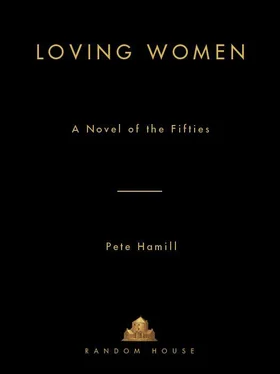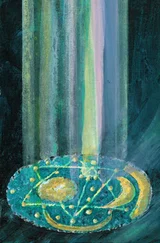“Look at that kid’s eyes,” Miles whispered, pointing at Kuniyoshi’s fat boy. “He’s a monster. All appetite, all need, all want. Look at the way his hair is parted down the middle.… And see, he’s got a little sailor boy’s shirt on, but it’s not blue . It’s the color of dried blood. And the blue walls, the blue dead sky, you know he’s living in a cold bleak world and eats to make himself feel alive .…”
Suddenly a door behind us opened and closed. And Harrelson was there, drunk, his eyes small and glittery. He looked at Miles and then at me.
“Well, looka this.”
“Fuck off, Harrelson,” Miles said. “The Russians are coming.”
“ Two of you … in the shithouse. In the middle of the goddamn night . Ain’t that cute.”
I stepped forward. “What’s that supposed to mean?”
“You and honeybunch here,” he said and grinned. “Couple of the year.”
I grabbed him by his jumper and slammed him against the wall. I came within an inch of his face, smelling the souring booze on his breath.
“You say another word,” I whispered, “and I’ll break your fuckin head.”
Someone yelled from the darkness of the barracks. “Knock it off!” And another: “Go to fucking bed!”
I waited for them to be quiet and released my grip on Harrelson. I was trembling. Not in fear of Harrelson. I was afraid of my own sudden rage. I might punch myself into the brig.
“You’re a real fresh boy,” Harrelson said coldly.
“And you’re a sick bastard,” I said. “Make any more remarks, to me or Miles and I’ll knock your dick stiff. He’s my friend , got it? Friend.”
Harrelson said, sarcastically, “Excuse me.” He swished past me to the urinals and pissed for a long time, humming “I Can’t Help It if You’re Still in Love With Me.” I almost laughed. He was such a relentless bastard. And the fury seeped out of me. Harrelson was mean, and I’d just slammed him around; but I had to love him for this. Hank Williams all the way. When he was finished, he looked at us in an offended way, and walked into the dark slumbering barracks. I exhaled a little too loudly. And then chuckled in a forced way. Miles Rayfield wasn’t laughing.
“Thanks,” he said, and walked quickly to his bunk.
Afterward it was even harder to sleep. Harrelson was now my enemy and I didn’t want enemies. Not here. Not anywhere. I didn’t want to have to watch my back. I didn’t want anyone working against me in secret. I’d defended myself: yes. And I had defended Miles Rayfield. But suppose Harrelson was right about Miles? What did that mean about me ? Miles was my friend. He didn’t hoard what he knew about painting and drawing; he shared it with me, and nobody in the world had ever done that before. And he was pushing me to be better, to grow out of comics and childhood, to look at real art, to try it myself. His friendship was a challenge. He’d already showed me how to make money. In a way, he had turned me pro. But if I liked him and he was queer , did that make me queer too? It was so goddamned confusing.
I got up again and went back into the head and studied the other pictures in Miles’s folder. Painters named Adolph Dehn and Aaron Bohrod, Anton Refrigier and Arnold Blanch. Maybe Miles had handed me his folder of painters whose first names started with A. None of them were in the same league with Kuniyoshi.
And then I saw Ben Shahn for the first time and I said out loud, Jesus Christ . These were pictures I understood. Ben Shahn. He had to come from the kind of places I came from. Here was a picture called Handball . A high handball court with four players in front of it, one of them a Negro wearing a hat. There were two men watching in the foreground. One in a cap, his hands jammed deep into his baggy trousers. The other’s hands were folded. Beyond the handball court stood a row of tenements. I felt as if I’d played on that court, stood on that street. I was certain I knew the guy with the cap. In another Ben Shahn picture called Vacant Lot there was a boy in a sweater and knickers just like those I wore until I was eleven. A white shirt collar rose above the sweater and he was playing ball alone against a brick wall in a vacant lot. The boy was totally isolated. Sitting there in the john, in Pensacola, Florida, on the day Stalin died, I thought of long Saturday mornings in Brooklyn, up early to serve Mass at Holy Name and how it felt when Mass was finished and it was still early and the neighborhood was silent because the men weren’t up yet and I would go down to the Ansonia Clock Factory and play ball alone against its dirty brick walls. I looked at the picture thinking: This could be me .
Then I heard a door open and slam and someone bouncing off a wall and a giggle and a new stirring in the barracks. I got up. It was Sal. He saw me and excused himself and went past me and pissed in the sink.
“Had to do that since I left the Dirt Bar,” he said.
“I thought all leave and liberty was canceled,” I said.
“Nah, just a rumor. Stalin’s still dead.”
“Where’s Sam?”
“Blow job.”
“What about you?”
“Too broke up about Joe,” he said, and went off to bed. One of these nights, I thought, I have to really talk to Sal.
And I did.
What Sal Told Me
M y father is a baker, I like to say: he bakes cars. He owns a body shop in the South Bronx and fixes cars from all over the borough . He never asks anyone for registration papers. A guy wants a black car painted pink? Why not? You want certain numbers filed off the engine block? Step right up. The old man does good work. He has a good eye for color, and he can do anything with his hands. He could’ve been a sculptor in another life. I guess when he was young he didn’t have the choices a lot of people get in this world. Before he got the body shop he worked in a gas station, and before that he fought World War II .
But in a weird way I always thought that my father’s father was my real father. He lived three blocks away from us, in a tiny apartment packed with books and magazines and old brown photographs. Their family was from Florence, in Tuscany, and they were always Reds. They didn’t mean what we mean by a Red. Grandpa was some kind of socialist anarchist. He thought everything in the country should be shared by the people. Food, the ports, oil, big industry, every fucking thing. Nobody should starve. Nobody should be unemployed. Everybody should have a doctor. You know, real terrible disgusting stuff that would destroy the United States if we had it. But then Grandpa also felt that if there was a government, he was against it . “Ideas are wonderful,” he would shout, in the apartment, with his books everywhere, pulling on his white beard, his arms flying around . “Abstractions are wonderful. Love is wonderful and justice is wonderful and the common good? Most wonderful of all. But the son of a bitching politicians will always sell you out or put you in the dungeon .”
He married a woman from Siena. I don’t remember her. She died in the early thirties, after my father was born. There were pictures of her around, though, and she seemed thin and a little afraid, standing in Coney Island or out at the Statue of Liberty, her eyes looking at you like she didn’t know what the fuck she was doing in this country. Grandpa himself would never say exactly why he came to New York. There was some trouble in the Old Country, he’d say, that’s all. I could never find out what it was, but it must’ve had something to do with him being a Red .
Читать дальше












